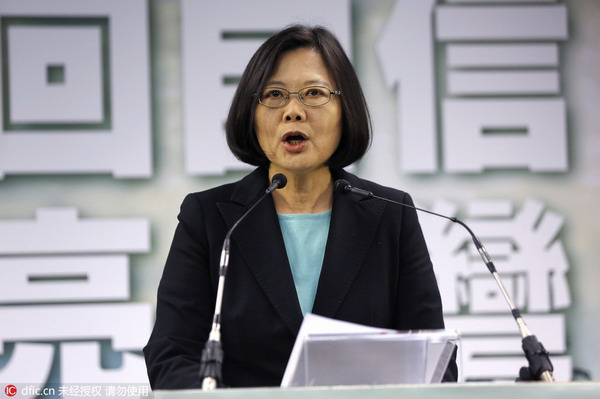 |
|
Taiwan's main opposition Democratic Progressive Party, DPP, Chairperson Tsai Ing-wen speaks during a press conference in Taipei, Taiwan, Wednesday, April 15, 2015. [Photo/IC] |
New Taiwan leader Tsai Ing-wen is scheduled to make transit stops in Miami and Los Angeles in the United States during her nine-day overseas trip that will also take her to Panama and Paraguay. The overseas trip starting on Friday will be her first since taking office more than a month ago.
Many of her predecessors have chosen a similar itinerary, but not all of them conveyed goodwill. Chen Shui-bian of the Democratic Progressive Party who was the island leader from 2000 to 2008, had a shameful record of touting "Taiwan's formal independence" to foreign leaders during such visits and thus posing a grave threat to cross-Straits relations.
Whether or not Tsai will resort to the same trick during her overseas trip will be closely watched, as she is yet to offer an unequivocal answer to how she sees the 1992 Consensus, the political foundation of cross-Straits ties. The tradition of "leadership diplomacy" dates back to the 1990s, when Lee Teng-hui, then Taiwan leader, flagrantly violated the 1992 Consensus by trying to convince some "diplomatic allies" that the Chinese mainland and Taiwan were two separate states. In return, he was banned from entering the US during the rest of his tenure.
In stark contrast, Kuomintang leader Ma Ying-jeou managed to make things right because of his adherence to the 1992 Consensus. During his eight-year tenure, Taiwan enjoyed the dividends of a series of fruitful exchanges with the mainland. He even attended the funeral ceremony of former Singapore prime minister Lee Kuan Yew thanks to the proper arrangements agreed by both sides of the Straits.
Given the facts, Tsai's first overseas trip-and probably many more to come-will prove to be a fool's errand if she and the pro-independence DPP refrain from making their stance clear on the 1992 Consensus. The prospect of the so-called leadership diplomacy is rather dim because the island, in the face of an ongoing economic slowdown, cannot afford to play the endless game of "buying support" of some countries.
Since Tsai contacted some American political heavyweights right after assuming office, she got the green light to enter the US via two transit stops. Nevertheless, this is unlikely to change the fact that such a civil interaction is still under the framework of the China-US relationship.
The US, on its part, should not provide the "soil" for some Taiwan residents' secessionist activities, because it has made solemn promises to uphold the one-China policy. In fact, the US' awkward position in the Taiwan question has a lot to do with the wrong signals it has sent out, such as selling advanced weapons to the island and arranging high-level contacts. But it would be unwise for the US to replay the old drama, for that will certainly jeopardize China-US ties.
In addition, the way Tsai clarifies her stance, especially her administration's stance, on cross-Straits relations and the 1992 Consensus during her meeting with US officials will exert notable influence on the regional situation. So it is important that Tsai makes the right move and doesn't pursue the so-called independence through diplomatic channels.
The author is a professor at the Institute of Taiwan Studies, Beijing Union University.